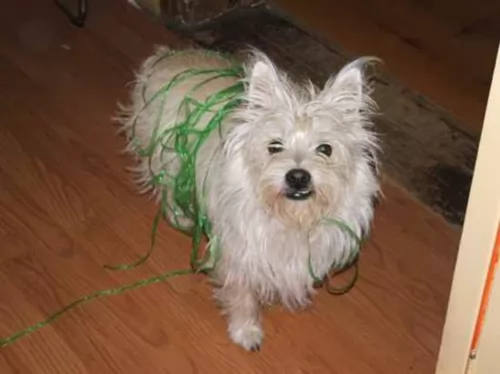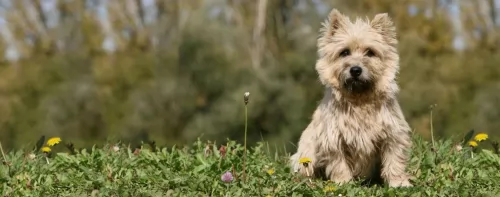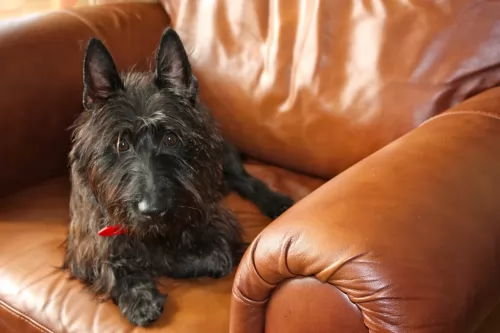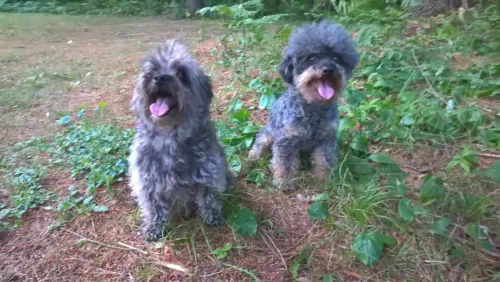 Petzlover
Petzlover Cairland Terrier is originated from United Kingdom but West Siberian Laika is originated from Russia. Cairland Terrier may grow 28 cm / 11 inches shorter than West Siberian Laika. Cairland Terrier may weigh 15 kg / 33 pounds lesser than West Siberian Laika. Cairland Terrier may live 3 years more than West Siberian Laika. Both Cairland Terrier and West Siberian Laika has same litter size. Both Cairland Terrier and West Siberian Laika requires Low Maintenance.
Cairland Terrier is originated from United Kingdom but West Siberian Laika is originated from Russia. Cairland Terrier may grow 28 cm / 11 inches shorter than West Siberian Laika. Cairland Terrier may weigh 15 kg / 33 pounds lesser than West Siberian Laika. Cairland Terrier may live 3 years more than West Siberian Laika. Both Cairland Terrier and West Siberian Laika has same litter size. Both Cairland Terrier and West Siberian Laika requires Low Maintenance.
 The Cairland Terrier is a cross between the Cairn Terrier and the West Highland White Terrier. It simply means that if you own a Cairland, you’re going to get a little bit of each dog in him.
The Cairland Terrier is a cross between the Cairn Terrier and the West Highland White Terrier. It simply means that if you own a Cairland, you’re going to get a little bit of each dog in him.
This hybrid is a new breed which means you’re not going to get too much documented history on the dog. A tough little hunter of fox and otter, the Cairnland is thought to hail from Scotland.
 The West Siberian Laika come from the Khanty and Mansi tribes of West Siberia and Ural. They are a primitive breed used for hunting and come from the spitz and wolf lines. They retain many of their primitive looks and traits to this day. They were pre-historic companions to human hunters and remain so today in the northern regions of the Russia. They were never sled dogs but pure hunters throughout their journey to a domesticated breed. They hunted in the forests of the mountainous regions and were adapted to hunting in the woods. When their prey was hunted almost to extinction, the Laikas were also in danger of disappearing.
The West Siberian Laika come from the Khanty and Mansi tribes of West Siberia and Ural. They are a primitive breed used for hunting and come from the spitz and wolf lines. They retain many of their primitive looks and traits to this day. They were pre-historic companions to human hunters and remain so today in the northern regions of the Russia. They were never sled dogs but pure hunters throughout their journey to a domesticated breed. They hunted in the forests of the mountainous regions and were adapted to hunting in the woods. When their prey was hunted almost to extinction, the Laikas were also in danger of disappearing.
From the early days of the 1900’s through the first World War, there were several campaigns to save the WSL from extinction. A breed standard was developed around the 1930’s. Following the war the breeding programs became more uniformed and followed the standard that was in place. World War II disrupted it again, but once again it was resumed after the war.
The breed was once again threatened by industrialization and deforestation in the early 20th century, as they were replaced by newer, more popular breeds. There were thought to be dozens of aboriginal Laikas with various groups attached to different groups of indigenous hunters.
Following the second World War and the ever increasing detail of breed standards, the Laikas were divided into four pure bred groupings: the West Siberian Laika, the East Siberian Laika, the Russ-European Laika and the Karelo-Finnish Laika. All of these breeds are Laikas because they are bark pointing hunters.
They were imported to the U.S. in the early 1990’s by a Russian immigrant. Vladmir Beregovoy is credited with bringing the breed to the States. There are now about 300-400 West Siberian Laika’sin the U.S. They are a very emotional breed, very in touch with his human’s feelings, habits and intentions. He is a barker for sure who hates to be left alone. An intense breed with the need for companionship and a purpose. They will do anything to escape a pen if left alone for long periods of time.
The breed is protective of its people with other animals and some are wary of strangers. He needs an active family to match his active spirit. They will bark at all wild life including all the squirrels in your yard. So if don’t want a “barker”, don’t get a West Siberian Laika.
They are recognized by the United Kennel Club, the American Canine Association the Dog Registry of American and the Federation Cynologique Internationale
 The Cairland Terrier is a small dog standing anything between 20 and 35cm in height and weighing in at roughly 4 to 10kg. He has short legs, a compact little body, while being muscled and strong. He has small erect ears with a shortish upright tail.
The Cairland Terrier is a small dog standing anything between 20 and 35cm in height and weighing in at roughly 4 to 10kg. He has short legs, a compact little body, while being muscled and strong. He has small erect ears with a shortish upright tail.
The color of the medium length coat can be fairly varied which means brown, black, cream, fawn, brindle or even white from the Westie. The dog has two coats with the topcoat being fairly harsh, coarse and straight to slightly wavy while the undercoat is soft.
When it comes to temperament, the Cairland Terrier is social and feisty with a high self-esteem. He has a strong personality and can be somewhat stubborn but he is a great friend of children in the home. He just loves to take part in all their games.
With training and socialization which he undergoes easily, he will get on well with other pets too, although he can become aggressive with other dogs in his territory.
 The WSL comes from the Spitz line and also directly descendent from the wolf. They look and act a lot like a wolf in many ways. They have retained much of their primitive traits. With a pointed, long muzzle, an almost square head, and square body, they have wolf colored coats of gray and red. They are mostly medium in size but some can be smaller or larger. Their head is shaped like a wedge, their eyes are typical almond shape and set deep in their head. They are brown or even darker. The muzzle is almost as long as the skull. Their lips are thin and black. The ears are straight up and pricked.
The WSL comes from the Spitz line and also directly descendent from the wolf. They look and act a lot like a wolf in many ways. They have retained much of their primitive traits. With a pointed, long muzzle, an almost square head, and square body, they have wolf colored coats of gray and red. They are mostly medium in size but some can be smaller or larger. Their head is shaped like a wedge, their eyes are typical almond shape and set deep in their head. They are brown or even darker. The muzzle is almost as long as the skull. Their lips are thin and black. The ears are straight up and pricked.
They have bodies longer than they are tall with a lot of musculature. They carry their tail high over their backs. With straight legs and forward feet, with gray, red and white coats, they still look like wild dogs.
 Terriers are dogs that are full of character and self-confidence, and your Cairland Terrier is no different. These small dogs in the Terrier group don’t actively look for a fight with other dogs, but if they are provoked, they aren’t intimidated and will give bigger dogs a piece of their mind. They make splendid pets and will always be ready for a game.
Terriers are dogs that are full of character and self-confidence, and your Cairland Terrier is no different. These small dogs in the Terrier group don’t actively look for a fight with other dogs, but if they are provoked, they aren’t intimidated and will give bigger dogs a piece of their mind. They make splendid pets and will always be ready for a game.
Make sure that your Cairland Terrier remains the feisty little character he is by making sure he gets well looked after. Dogs aren’t known as man’s best friend for nothing, and in exchange for the care you give your Terrier, you’ll be rewarded by a loyal and devoted friend.
 3.Adaptability This is not really an apartment dog though he can adapt. He needs outdoor space to run everyday. So if in an apartment find a dog park for everyday use.
3.Adaptability This is not really an apartment dog though he can adapt. He needs outdoor space to run everyday. So if in an apartment find a dog park for everyday use.
4.Learning ability – Highly trainable and very smart. Independent thinker though might cause some issues.
 Your Cairland is a tough, feisty little dog and you’re not going to find yourself constantly having to take him to the vet. However even healthy dogs can be affected by ill health, and we look at a couple of illness you want to watch for with your Terrier.
Your Cairland is a tough, feisty little dog and you’re not going to find yourself constantly having to take him to the vet. However even healthy dogs can be affected by ill health, and we look at a couple of illness you want to watch for with your Terrier.
This can be brought on by a change in diet. Usually you can keep food away from your pet for 24 hours, allowing the stomach to empty and to settle. However, if there is blood in the diarrhoea or your dog is vomiting, then veterinary advice must be sought.
Just like humans, a dog can have an allergy to pollen where you see watering of the eyes as well as sneezing. This is because of inflammation of the mucous membranes in the nose. Your vet can ease the problem for your pet.
 Health wise there are no genetic health issues known today. Since they were so wild, primitive and isolated there was not a lot of inbreeding to any standards. There are however some interesting health facts about the WSL.
Health wise there are no genetic health issues known today. Since they were so wild, primitive and isolated there was not a lot of inbreeding to any standards. There are however some interesting health facts about the WSL.
• Females only come into estrus once a year, usually in the late winter. They are usually one to two or two and a half years old when this happens. The Russians who know them best frown on breeding them before they are at least two.
• They are subject to many of the same parasites and some diseases like any other canine. But they are not susceptable to any illness specific to their breed.
• Hunting accidents might bet he biggest health threat this breed faces at the moment.
• However with more dogs being bred for the show ring, this could all change and genetic issues could begin to pop up for them.
 Because the Cairland Terrier is a hybrid breed, the coat can be wiry or soft, but it’s a low maintenance coat. He will need to be brushed twice a week. Some people take their Cairland to have the coat professionally trimmed while others buy a special stripping tool and they strip the hair a couple of times a year.
Because the Cairland Terrier is a hybrid breed, the coat can be wiry or soft, but it’s a low maintenance coat. He will need to be brushed twice a week. Some people take their Cairland to have the coat professionally trimmed while others buy a special stripping tool and they strip the hair a couple of times a year.
Small dogs are prone to dental disease, so you will need to brush your Cairland’s teeth at least two or three times a week. Dental disease is a serious problem with dogs and it won’t only affect the teeth and gums but it can result in infection which can contribute to organ failure. Periodontal disease is always a big problem with little dogs. If you’re not sure how to go about looking after your dog’s teeth, you can always take your dog to the vet for dental check-ups and cleaning.
 performance, working dog food. High in protein and fat is needed to maintain their lean muscle. Don’t over feed them as they will become obese and they will be unhappy if their physical activities are restricted, even if by their own weight. Be sure you break up their day’s food amount into 3-4 smaller meals.
performance, working dog food. High in protein and fat is needed to maintain their lean muscle. Don’t over feed them as they will become obese and they will be unhappy if their physical activities are restricted, even if by their own weight. Be sure you break up their day’s food amount into 3-4 smaller meals.
2.Feeding the adult – Almost everything is equally true for the adult. They need a high protein and high fat food – a high performance food. Don’t over feed and give them at least 2 meals per day.
3.Points for Good Health – as previously mentioned this is a hardy and robust breed,
4. Games and Exercises They need a lot of exercise, have a strong prey drive and are very intelligent. A dog with those traits that does not get enough exercise will drive you crazy if he is not stimulated.